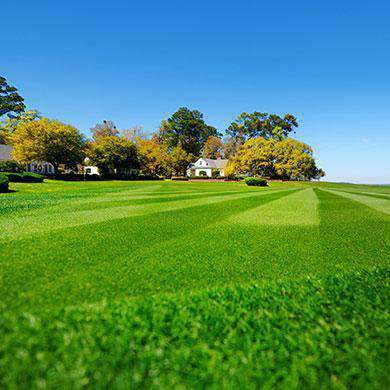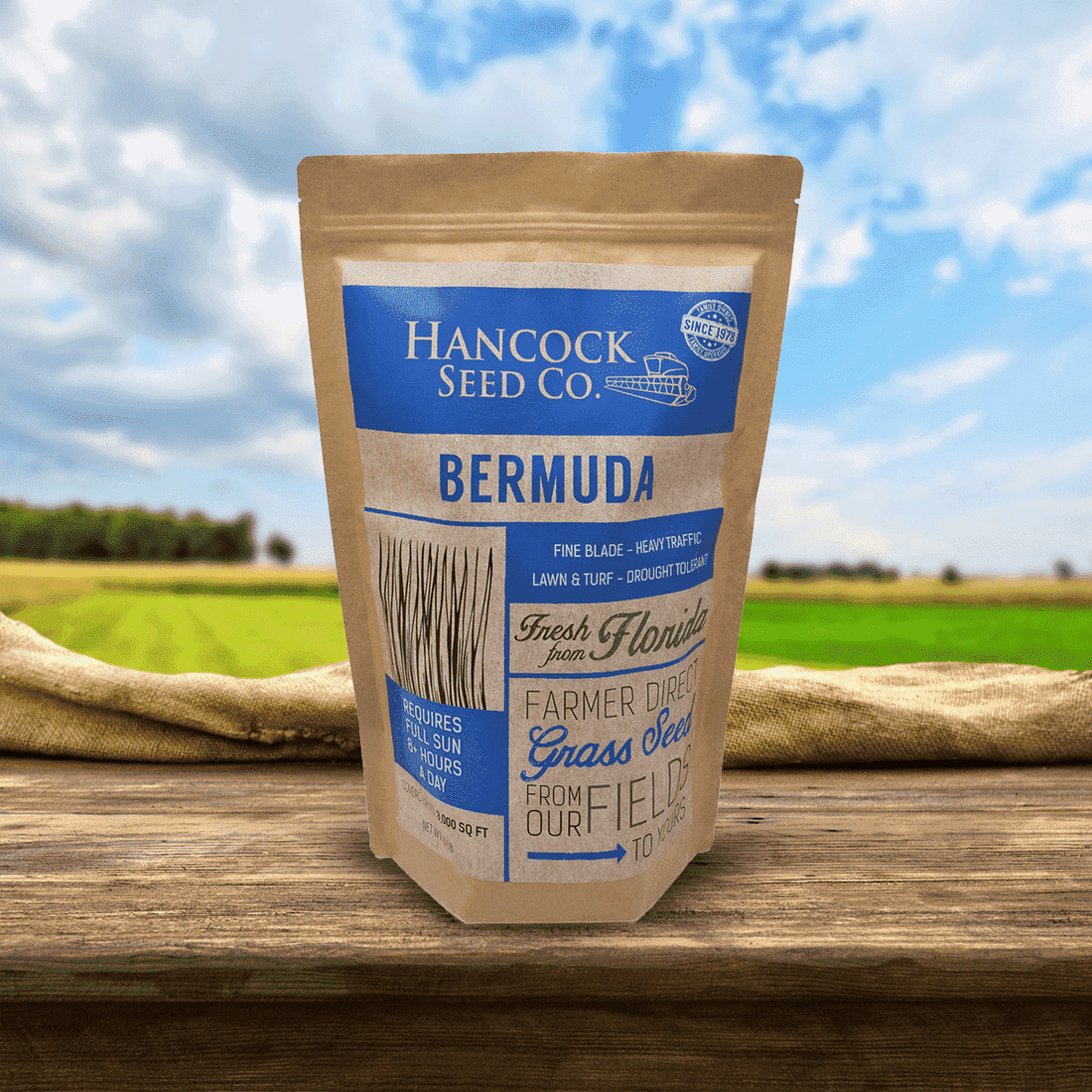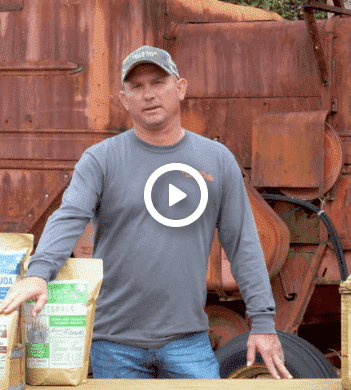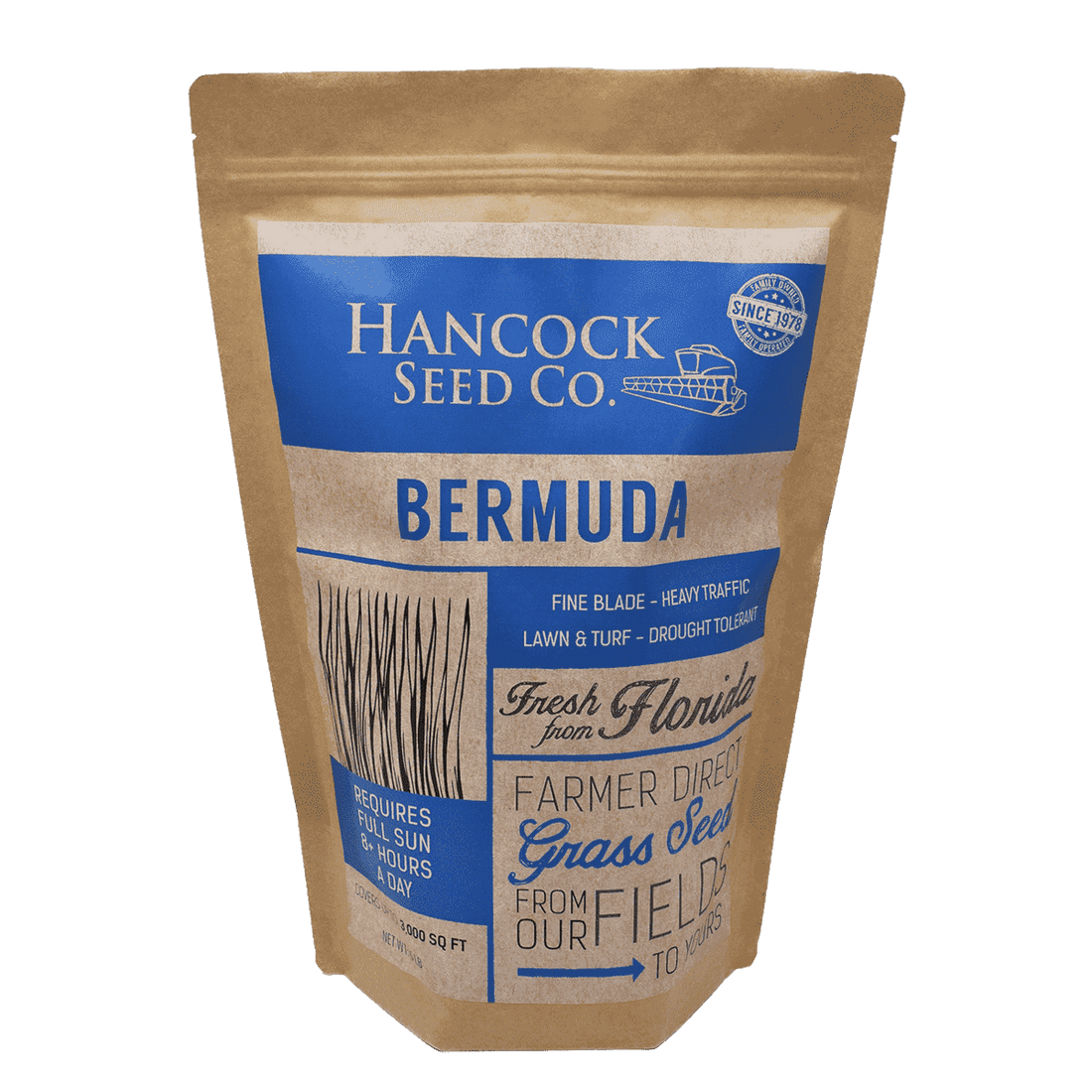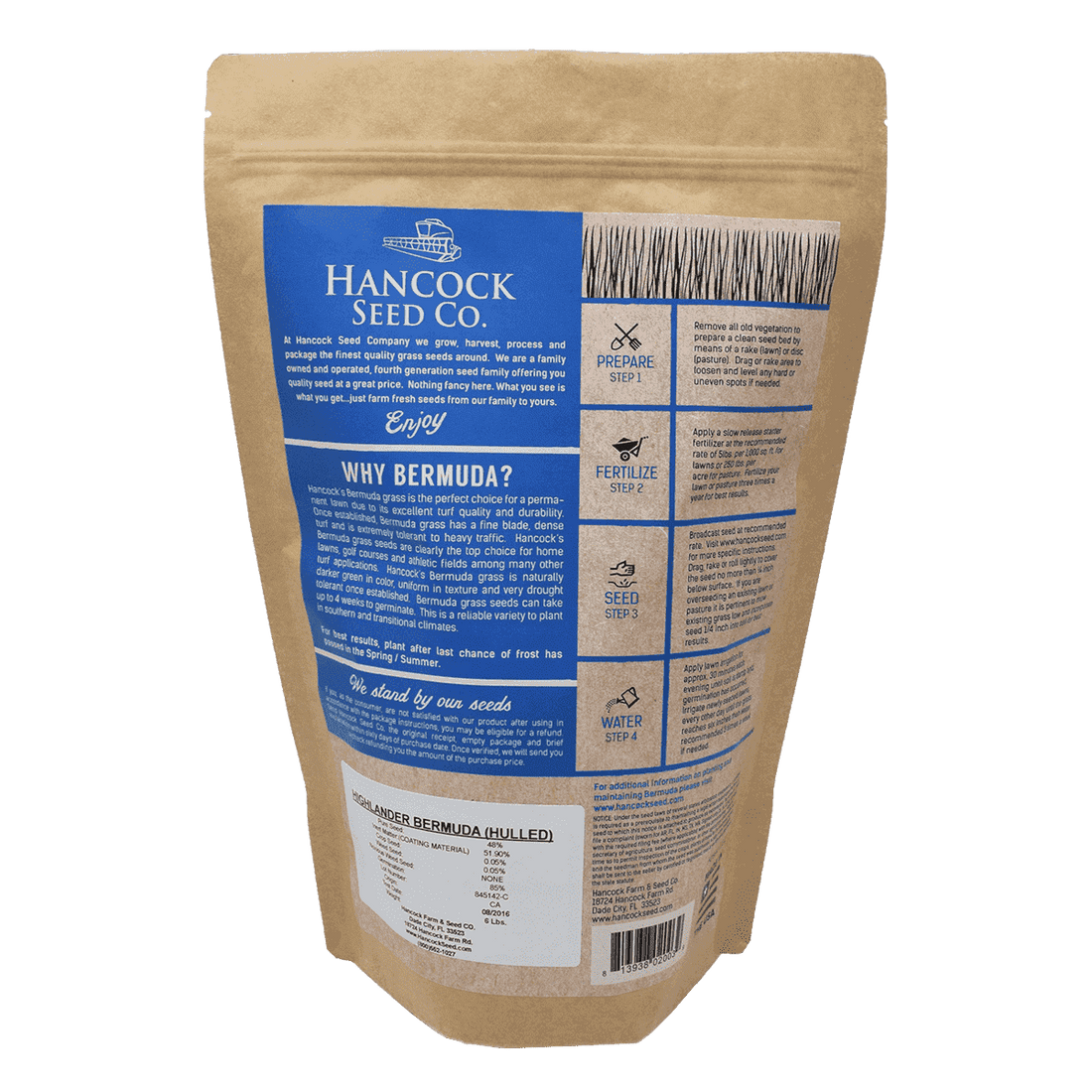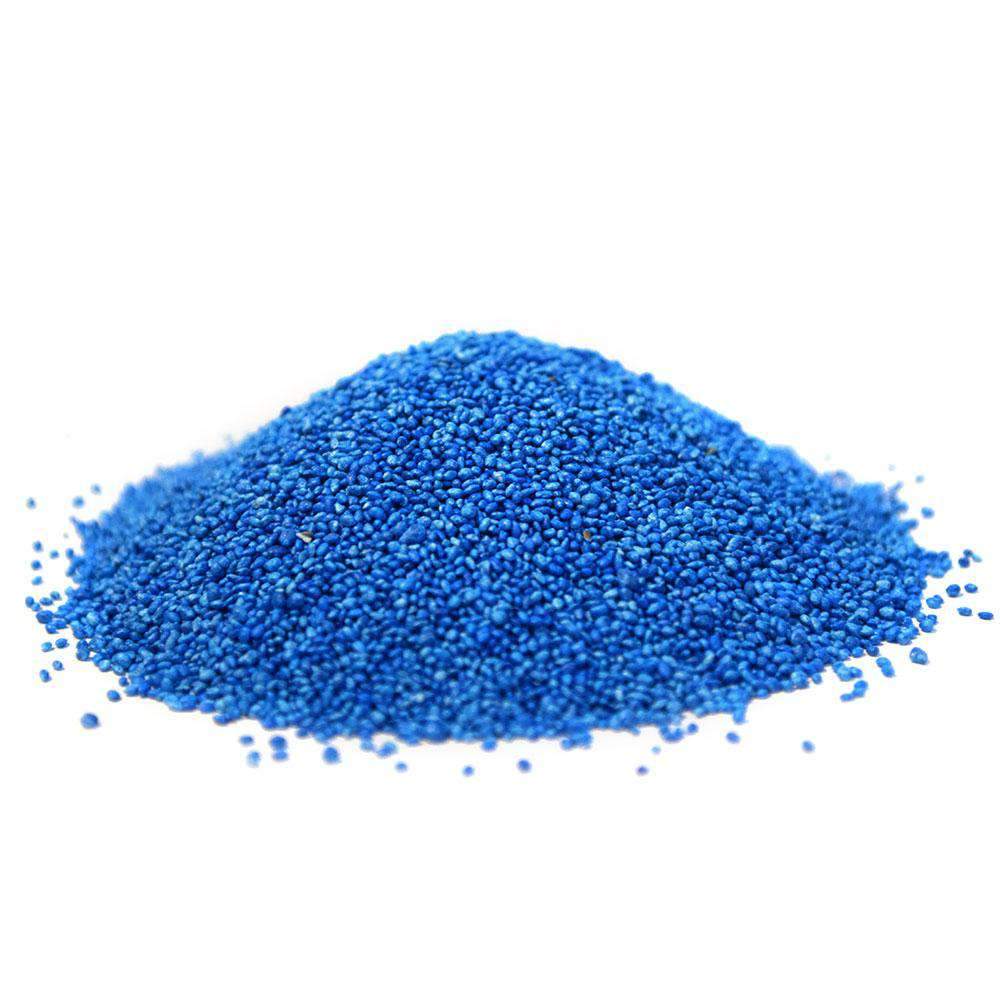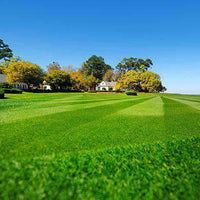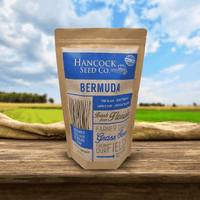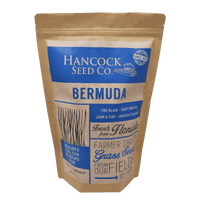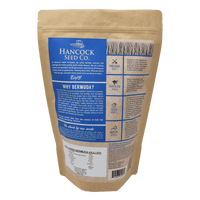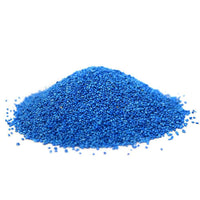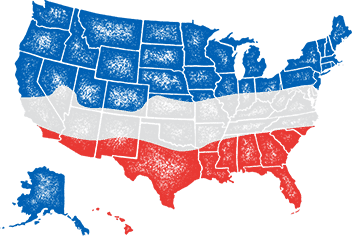
- When to plant:
- Fall, Winter
- Fertilizer:
- Hancock's 16-04-08 Lawn & Pasture Fertilizer
- Seeding rate:
- 5 lbs per 1000 sq. ft.(lawn) 75 - 100lbs per acre (pasture)
- Overseeding rate:
- 25 - 50 lbs. per acre
- Seeding depth:
- 1/8 - 1/4 inch
- Ideal ph:
- 5.8 - 7.0
- Gmo:
- No
- Inoculant needed:
- No
- Coated or raw:
- Coated
- Lifecycle:
- Perennial
- Climate zones:
- Transition Zone, Warm Season
Hancock's Bermuda Grass Seed Mix is the ideal solution for lawn and pasture grass areas that many other grass varieties will not grow or have not grown well. Our Bermuda Grass Seed Mix is also commonly used for erosion control applications. Hancock's Bermuda Grass Seed Mix is recommended for lawn or pasture grass seed applications in the central and southern United States.
Product Information
- Application or Use: Lawn, Pasture, Livestock Grazing, Cattle Forage, Erosion Control, Cover Crop
- Germination Time: Ryegrass - 5 - 7 days, Common Bermuda 7 - 14 days, under optimal conditions
- Growing Locations: Warm Season & Transition Zone
- Height: Lawn - 1 - 3 inches or Pasture - 8 - 12 inches
- Sunlight Requirements: 8+ hours, full sun for best results
- Advantages: Extreme drought and traffic tolerance with moderate tolerance to soils with poor nutrients
- When to Plant: Recommended planting time is fall and winter when nighttime temperatures are consistently below 65 degrees.
Hancock's Bermuda Grass Seed Mix contains the perfect mixture of Bermuda grass seed and quick-cover grass seed (to insure the Bermuda grass seedlings are not choked out during the establishment stage). Hancock's Bermuda Grass Seed Mix has performed well in dry, sandy areas, wet areas, horse pastures, wash-outs, new pasture applications, new lawn applications, and where many other grass varieties will not grow.
Adaptation
Hancock's Bermuda Grass Seed Mix is recommended for the southern U.S., including Florida, Georgia, South Carolina, North Carolina, Virginia, Kentucky, Tennessee, Alabama, Mississippi, Louisiana, Arkansas, Oklahoma, Texas, New Mexico, Arizona, and Southern California and Hawaii.
Planting and maintenance instructions are included.
Fall & Winter Mixture:
Common Bermuda Grass Seed
Gulf Annual Ryegrass
Brown Top Millet
Hancock's Fall & Winter Common Bermuda grass seed mixture contains 75% Un-Hulled and Coated Bermuda grass seed and 25% Annual Ryegrass. The Annual Ryegrass is added to assist in fast ground coverage, retaining soil moisture, and preventing soil and seed erosion. The Annual Rye will also provide an effective spring germination environment for the permanent Bermuda grass. The Annual Ryegrass will begin to die out as spring nighttime temperatures increase to 65-70 degrees. The Bermuda grass will begin to emerge through the established Annual Ryegrass root structure as the Annual Ryegrass begins to die out. Bermuda Grass seed requires 2-3 weeks of constant 65 to 70 degree nighttime temperatures, combined with soil moisture to stimulate germination. It is important to water and mow the newly seeded areas in the spring. This prevents the Annual Ryegrass from overcrowding and shading out the young Bermuda Grass seedlings as they emerge. Please refer closely to the planting guide provided with your order to insure a successful seeding and establishment experience.
Rave Reviews
It's no secret why Hancock's Bermuda Grass Seed Mix is so popular. The answer is "because it works"! Here are a few of our favorite reviews from clients who have planted Hancock's Bermuda Grass Seed Mix:
"This was my first time ordering and it was a great experience; your website is very easy to navigate and read about the seed options," writes customer Raelene P. "Quick shipping. I spread my seed yesterday and it was very easy using the directions included. Will definitely be buying from you again!"
"So far the seed germinated in about 8 days," says Willard L. "Looks like almost full germination. Grass is up and I’m watering every afternoon. Happy with purchase and will buy again from Hancock seed."
*Product packaging may appear different than what is pictured.
Remove all old vegetation to prepare a clean seedbed by means of a rake (lawn) or disc (pasture). Drag or rake area to loosen and level any hard or uneven spots if needed.
Broadcast seed at recommended rate. Drag, rake or roll lightly to cover the seed no more than 1/8 in. below surface. If you are overseeding an existing lawn or pasture, it is essential to mow existing grass low and incorporate seed 1/4 in. into soil for best results.
For lawns, apply 5-10 lbs. of 16-04-08 slow release fertilizer per 1000 sq. ft., four times a year (late Spring, Mid-summer, late Summer, and early Fall) for the first two years. Apply 5 lbs. per 1000 sq. ft. two times (mid-Summer, late Summer) a year after a fully established lawn has been accomplished. For pasture fertilization, Apply 250 lbs. of 16-04-08 slow release fertilizer per acre in late Spring, mid-Summer and early Fall. Animals that are grazing will damage the Bermuda grass if the pasture is not fertilized annually. The grass must be provided with adequate nutrients to compete with the animals.
Apply lawn irrigation for approximately 30 minutes every evening until soil is damp, and germination has occurred. Irrigate newly-seeded lawns every other day until the grass reaches 6 in., then water recommended 3 times a week if needed.
For best results, please review our Planting Guide and the specific product description before planting. Each product has recommended planting methods, timing, and seeding rates that are important for successful establishment. Following these guidelines will help ensure optimal performance and stand success.

Seed Quality
Hancock Seed is dedicated to delivering the best seeds possible to our customers. Hancock Seed grows and harvests many of our products, and we acquire the majority of the rest from other family farmers.
All these seeds are processed, packaged and shipped from Hancock Farm. This helps us ensure that our high standards are met. Unlike much of the competition, we refuse to sell you a seed that was not gathered during the last harvest. You will always receive fresh product from Hancock.
Every seed we grow comes with 40 years of experience behind it...you can rest assured that all of our products are cultivated in a method that assures its potential for growth.
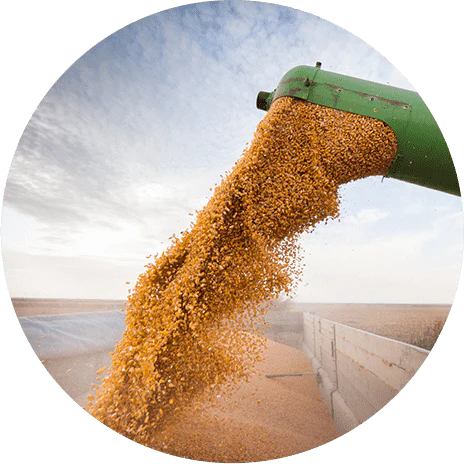
Your cart ( 0 )

Hancock's Bermuda Grass Seed Mix is the ideal solution for lawn and pasture grass areas that many other grass varieties will not grow or have not grown well. Our Bermuda Grass Seed Mix is also commonly used for erosion control applications. Hancock's Bermuda Grass Seed Mix is recommended for lawn or pasture grass seed applications in the central and southern United States.
Product Information
- Application or Use: Lawn, Pasture, Livestock Grazing, Cattle Forage, Erosion Control, Cover Crop
- Germination Time: Ryegrass - 5 - 7 days, Common Bermuda 7 - 14 days, under optimal conditions
- Growing Locations: Warm Season & Transition Zone
- Height: Lawn - 1 - 3 inches or Pasture - 8 - 12 inches
- Sunlight Requirements: 8+ hours, full sun for best results
- Advantages: Extreme drought and traffic tolerance with moderate tolerance to soils with poor nutrients
- When to Plant: Recommended planting time is fall and winter when nighttime temperatures are consistently below 65 degrees.
Hancock's Bermuda Grass Seed Mix contains the perfect mixture of Bermuda grass seed and quick-cover grass seed (to insure the Bermuda grass seedlings are not choked out during the establishment stage). Hancock's Bermuda Grass Seed Mix has performed well in dry, sandy areas, wet areas, horse pastures, wash-outs, new pasture applications, new lawn applications, and where many other grass varieties will not grow.
Adaptation
Hancock's Bermuda Grass Seed Mix is recommended for the southern U.S., including Florida, Georgia, South Carolina, North Carolina, Virginia, Kentucky, Tennessee, Alabama, Mississippi, Louisiana, Arkansas, Oklahoma, Texas, New Mexico, Arizona, and Southern California and Hawaii.
Planting and maintenance instructions are included.
Fall & Winter Mixture:
Common Bermuda Grass Seed
Gulf Annual Ryegrass
Brown Top Millet
Hancock's Fall & Winter Common Bermuda grass seed mixture contains 75% Un-Hulled and Coated Bermuda grass seed and 25% Annual Ryegrass. The Annual Ryegrass is added to assist in fast ground coverage, retaining soil moisture, and preventing soil and seed erosion. The Annual Rye will also provide an effective spring germination environment for the permanent Bermuda grass. The Annual Ryegrass will begin to die out as spring nighttime temperatures increase to 65-70 degrees. The Bermuda grass will begin to emerge through the established Annual Ryegrass root structure as the Annual Ryegrass begins to die out. Bermuda Grass seed requires 2-3 weeks of constant 65 to 70 degree nighttime temperatures, combined with soil moisture to stimulate germination. It is important to water and mow the newly seeded areas in the spring. This prevents the Annual Ryegrass from overcrowding and shading out the young Bermuda Grass seedlings as they emerge. Please refer closely to the planting guide provided with your order to insure a successful seeding and establishment experience.
Rave Reviews
It's no secret why Hancock's Bermuda Grass Seed Mix is so popular. The answer is "because it works"! Here are a few of our favorite reviews from clients who have planted Hancock's Bermuda Grass Seed Mix:
"This was my first time ordering and it was a great experience; your website is very easy to navigate and read about the seed options," writes customer Raelene P. "Quick shipping. I spread my seed yesterday and it was very easy using the directions included. Will definitely be buying from you again!"
"So far the seed germinated in about 8 days," says Willard L. "Looks like almost full germination. Grass is up and I’m watering every afternoon. Happy with purchase and will buy again from Hancock seed."
*Product packaging may appear different than what is pictured.
Remove all old vegetation to prepare a clean seedbed by means of a rake (lawn) or disc (pasture). Drag or rake area to loosen and level any hard or uneven spots if needed.
Broadcast seed at recommended rate. Drag, rake or roll lightly to cover the seed no more than 1/8 in. below surface. If you are overseeding an existing lawn or pasture, it is essential to mow existing grass low and incorporate seed 1/4 in. into soil for best results.
For lawns, apply 5-10 lbs. of 16-04-08 slow release fertilizer per 1000 sq. ft., four times a year (late Spring, Mid-summer, late Summer, and early Fall) for the first two years. Apply 5 lbs. per 1000 sq. ft. two times (mid-Summer, late Summer) a year after a fully established lawn has been accomplished. For pasture fertilization, Apply 250 lbs. of 16-04-08 slow release fertilizer per acre in late Spring, mid-Summer and early Fall. Animals that are grazing will damage the Bermuda grass if the pasture is not fertilized annually. The grass must be provided with adequate nutrients to compete with the animals.
Apply lawn irrigation for approximately 30 minutes every evening until soil is damp, and germination has occurred. Irrigate newly-seeded lawns every other day until the grass reaches 6 in., then water recommended 3 times a week if needed.
Instructions
For best results, please review our Planting Guide and the specific product description before planting. Each product has recommended planting methods, timing, and seeding rates that are important for successful establishment. Following these guidelines will help ensure optimal performance and stand success.















